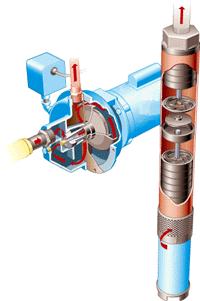 |
Well Information
Properly constructed private water supply systems require little
routine maintenance. These simple steps will help protect your system
and investment.
- Always use licensed or certified water well drillers and pump
installers when a well is constructed, a pump is installed or the
system is serviced.
- An annual well maintenance check, including a bacterial test, is
recommended. Any source of drinking water should be checked any
time there is a change in taste, odor or appearance, or anytime a
water supply system is serviced.
 Keep hazardous chemicals, such as paint, fertilizer, pesticides,
and motor oil far away from your well.
Keep hazardous chemicals, such as paint, fertilizer, pesticides,
and motor oil far away from your well.
- Periodically check the well cover or well cap on top of the
casing (well) to ensure it is in good repair.
- Always maintain proper separation between your well and
buildings, waste systems or chemical storage facilities. Your
professional contractor knows the rules.
- Don't allow back-siphonage. When mixing pesticides, fertilizers
or other chemicals, don't put the hose inside the tank or
container.
- When landscaping, keep the top of your well at least one foot
above the ground. Slope the ground away from your well for proper
drainage.
- Take care in working or mowing around your well. A damaged
casing could jeopardize the sanitary protection of your well.
Don't pile snow, leaves, or other materials around your well.
- Keep your well records in a safe place. These include the
construction report, as well as annual water well system
maintenance and water testing results.
- Be aware of changes in your well, the area around your well, or
the water it provides.
- When your well has come to the end of its serviceable life
(usually more than 20 years), have your qualified water well
contractor properly decommission your well after constructing your
new system.
|
Warning! This house could be hazardous to your health!
Youd be hard pressed to sell a home with such a label attached to it. And
yet, many older homes in the United States might qualify. You see, prior to
1978, paints and other products containing lead were widely used in homes and
offices. Chipping and pealing paint can expose occupants to this hazardous
material. In addition, many older plumbing systems utilized lead-based solder to
join pipes. This lead can leach into the water, especially when running hot
water. In certain areas, high concentrations of lead can even be found in the
ground soil.
Unknown in years past, it is now clear that lead causes a number of
health-related problems. In children this can include growth and learning
disabilities, headaches and even brain damage. Adults are not immune either.
High levels of lead have been tied to problem pregnancies, high-blood pressure
and digestive problems.
Before you buy or sell an older home, you need to know what hazards may
exist. If selling, federal law stipulates that you must disclose any lead-based
paint in the home. If youre buying, you want to know what hazards may be lurking
in the walls, as well as in the pipes, before you put up your earnest money. If
you suspect that a house contains high levels of lead, you should contact a
qualified professional to do an inspection. These tradesmen use a range of tools
from the well-trained eye to complex, specialized equipment to detect lead
levels and recommend appropriate solutions. The National Lead Information Center
(http://www.epa.gov/lead/nlic.htm)
can help you find a resource.
Many solutions exist for cleaning up lead concentrations. Depending upon your
situation, you may find one of these an adequate solution. Removing lead-based
paint, for example, may be as much trouble as it is worth. First, just the act
of stripping the paint from the walls is likely to create dust and debris which
is more likely to be ingested. Given these hazards, you should consult a
certified contractor to complete this kind of work. Short of removing the paint,
you may be able to get by with covering the old, lead-based paint with a coat of
sealant specifically designed for this purpose. Once again, a certified
contractor will be able to recommend an appropriate solution. Financial
assistance is even available in certain circumstances.
So even though a house may not carry a warning label from the EPA, a little
common sense and a sharp eye should keep your family safe.
 Keep hazardous chemicals, such as paint, fertilizer, pesticides,
and motor oil far away from your well.
Keep hazardous chemicals, such as paint, fertilizer, pesticides,
and motor oil far away from your well.